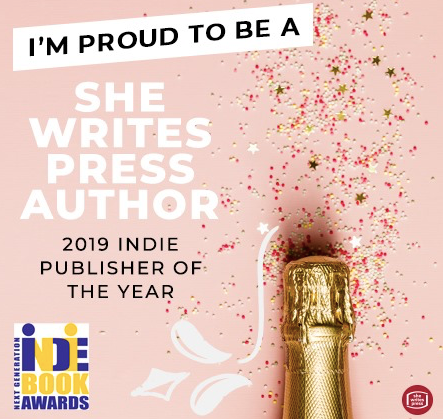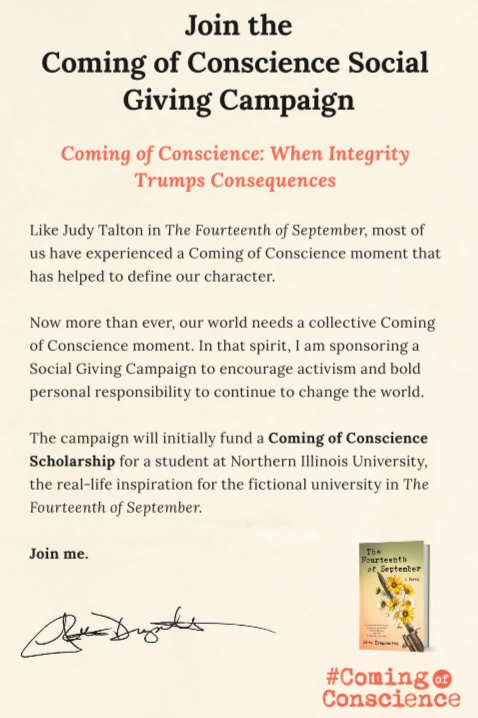Audiobook of "The Fourteenth of September" Now Available: Leave the Reading to Us
/Now that I have your attention, I will fess up that the novel has been available as an audiobook via Amazon since the book launch back in September of 2018. However, since I didn’t do any specific promotion on the format, it has just been sitting around, quietly, with modest purchases by experienced audiobook fans who knew how to find it. It’s time I gave it some love.
The Casting Cloud
The audiobook deserves its solo spotlight, given all the time and attention that went into producing it, but also because its development challenged me as an author in ways I’d never expected.
Right off the bat, the process of choosing a narrator sounded like great fun, but in practice it was unnerving. I can see why authors so often hate the films that are made of their novels. As a writer, you spend years picturing and “hearing” specific faces and voices in your head, and it’s very hard to envision, if you will, a stand-in. Very.
Though I was asked many times to narrate the The Fourteenth of September myself, I felt it needed a voice for my nineteen-year-old main character, Judy, that sounded the right age. The casting process for identifying potential narrators was exceptionally efficient. Over sixty professionals sent audition tapes based upon an excerpt I had provided. Just pick one, easy-peasy, right?
Hardly. I did have the foresight to hire an experienced producer to help me with the project—primarily because I was totally focused on the all-consuming production and promotion of the paperback and e-book. We both thought it would be a piece of cake. Not so much.
Thankfully, my producer winnowed the audition tapes down to a dozen for me to review to make it an easy afternoon project. Instead, it was... just... too much. All those voices—all good, all young, all saying the same thing, all sounding so... SIMILAR, but not at all like Judy. I felt instead that I was listening in on a gaggle of her friends at the Tune Room, the site of so much of the story’s action. I finally had to do what I’d been hoping to avoid—listen carefully to each audition over and over, trying to pick the voice I thought I’d want to listen to for hours on tape, but actually found myself looking for reasons to eliminate, so the last person standing (or in this case, talking) would be the obvious choice. It was a bit like shifting through great candidate resumes back in the day but with higher stakes for me and my story. I finally got it down to three, and the producer and I compared our choices and picked a final voice. Whew! I was ready to turn the nuts and bolts over to my producer to get back to the world of words on paper. But no such luck.
Nailing the Voices
Before I could walk away, the producer sent me the recording of the first two chapters, where each of the large cast of characters appeared at least once, to ensure the narrator had the voices correct. I was appalled. None of the voices matched the characters in my head. And all of them—male and female—had two things in common. They were PERKY, and the inflection of every sentence went up at the end. To borrow the vernacular, we SO didn’t talk like that back in 1969. We were happy or sad, sarcastic or whiney, enamored of the curse-word vocabulary we were trying out like truck drivers now that we had left home, but we weren’t full of endless pep every minute. We were never, ever PERKY. And, not being interrogative-loving French, we preferred to swallow the end of our sentences and let the words descend into unintelligible mumblings that our elders would struggle to understand perhaps, but we would never go UP. After all, that implied asking permission, and in Judy’s era we were more likely to be trying to disappear, be sullen, or have POWER. Oh, the Valley Girl of it all. I considered removing the word like from anywhere in my manuscript. It wasn’t there much, but somehow, after listening to the narrator, it sounded as if it were. I can fix this, I thought.
Author as Actor... Not
After years making business presentations, I told the producer I would settle this quickly. I recorded my own voice reading my own first two chapters, filled with my own intended tone and inflection, so easy then for the narrator to imitate, right? I was sure I’d be great. I’d once harbored an inclination toward the stage. The narrator would probably be in awe, and I needed to be prepared to keep her dauber up by reassuring her that she could do it, perhaps not as well, but she’d be fine.
Again, a surprise. I virtually slapped myself in the face. First of all, it was exhausting. Forget the character voices: I could hardly manage to keep the energy of my voice up let alone on inflection pitch for twenty pages in one sitting. And I... there is no more politic word to use... sucked. As the narrator might put it, “I am SO not an actress, ya know?” I couldn’t listen to myself, and above all, I DIDN’T SOUND LIKE JUDY. It was so hard to wrap my head around that. A few decades on or not, I deep down inside guess I thought the words in my mind would come out the way I heard them, sounding like Judy, and Wizard, and Vida, and David, and all my other characters. It wasn’t age, it was... like listening to your voice on the telephone. It wasn’t me and it wasn’t Judy. Instead I sounded vaguely like a more nasal version of my sister and the guys sounded like cheery kids, not the voices I needed to communicate the sarcastic bravado in the face of fear that ruled the story’s Draft Lottery time frame.
I feared what the narrator would think when she listened to my version; suddenly I felt that I was the one auditioning. “You call this acting?” I could hear her complain. “Don’t give it to her,” I said to my producer in a middle-of-the-night, follow-up email. Too late. “It did confuse her,” the producer admitted. “I think her narration is fine,” she added after a long, diplomatic pause, asking how I wanted to proceed. Someone needed to listen to the narration chapter by chapter as it was recorded, to be sure it was accurate, words weren’t dropped, etc. “It was critical,” she said.
I humbly told the producer to take me out of the loop and just run with the project. Like Puff, this little dragon sadly slipped into her cave, realizing that there was a reason I had chosen the boardroom over the stage in my earlier career.
In the end, I came to see why movie directors ban authors from the set. We are pathetic, not capable of suspending our belief. We are in love with the vision we put in words, yes, but also the one in the netherworld between the words we write with our inside voice and how they are delivered out to the world. Mere mortal actors/narrators who cannot hear inside our minds will never rise to this impossible-to-articulate ideal. And in fact, once I was out of it, things proceeded just fine; as pointed out by my producer, the narrator may not be “me,” but she is Judy. And isn’t that the point? I was a bit taken aback—after all, there would be no Judy without me—but of course she was correct.
At this point audible Judy is doing pretty well. See listener reviews on Audible and Goodreads, and listen to the excerpt. And also hear the narrator, Marissa DuBois, talk about her excitement for the project in this interview. Then, check out the audiobook yourself, which is available on Amazon on the same page as the other formats for The Fourteenth of September. One tip, be sure to turn up the speed when you listen, Judy has a lot to say... she needs to talk fast.
Audio Is Cooler Than You Think
My first audiobook was my own novel and that helped me catch the bug for my long, fair-weather walks along Lake Michigan and car rides. The more you use it, the more you think about where to use it. My trainer listens to audiobooks while she cleans her apartment, an idea I can absolutely get my head around. I’ve begun to inventory life activities that don’t require paying attention.
Above all, to my friends and family who tell me they support my story but just aren’t “readers,” or who only read nonfiction: Please try The Fourteenth of September on audiobook, and Judy’s voice will make it all go down in an exciting way. Let me know what you think... and about new creative ways to listen. I personally, for example, think my brother should read it during those endless hours of home repair and tinkering in the garage. I mean, he’s already on engineering-genius autopilot—he can listen to a story at the same time, right?
Time flies when someone’s telling you a story. For me, the audiobook experience is like Mrs. Sellen, my first-grade teacher, reading us Dr. Seuss’s The 500 Hats of Bartholomew Cubbins. Its like a personal movie. They talk and you imagine. You know, just like a book. Hands free. Enjoy!
























